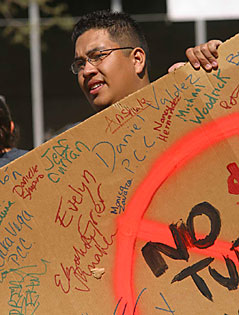 |
|
DAVID HARDEN/Arizona Daily Wildcat
|
UA president Pete Likins' tuition plan, which increases the cost of studying for both in-state and out-of-state students, was approved by the Arizona Board of Regents yesterday in Tempe.
|
|
By Jeff Sklar
Arizona Daily Wildcat
Friday March 7, 2003
Regents approve largest tuition hike in Arizona's history
TEMPE ÷ The Arizona Board of Regents approved the largest tuition increase in the state's history yesterday, voting 9-0 for a $1,000 hike for resident undergraduates coupled with a 140 percent increase in mandatory financial aid.
The increase will bring next year's in-state undergraduate tuition to $3,593.
Regents also approved $1,250 increases for out-of-state undergraduates and in-state graduate students, and a $1,500 increase for out-of-state graduate students.
It was a dramatic policy shift for the board, which last year voted 6-5 for a $96 tuition increase, believing low tuition was the best way to keep a university education affordable. Since then, several regents, including board president Jack Jewett, have reevaluated their position, saying financial aid is the key to university affordability.
Packaged with the hikes was an extensive financial aid package that will keep resident undergraduates who receive Pell Grants from feeling the financial ill effects of higher tuition.
"Having the financial aid in place, I think that's a milestone," Jewett said.
President Pete Likins has said that of the $34.5 million in revenue the tuition hike is expected to generate, more than $20 million will go toward financial aid.
The rest of the money generated by the hike will go toward helping the university recover from state budget cuts that have sliced more than $30 million from UA's coffers in the last two years.
"(Money) is at the very least the oxygen of the system, and without it the system will starve," said Regent Gary Stuart.
In recent weeks, administrators and the Faculty Senate have discussed using more than $6 million to improve faculty salaries through merit-based raises.
But the $13.9 million left after financial aid raises won't put UA on firm budgetary ground, Jewett said.
 |
|
DAVID HARDEN/Arizona Daily Wildcat
|
Daniel Valdez, a Pima Community College student, protests against the tuition increase outside the Arizona Board of Regents meeting in Tempe yesterday. He gathered signatures on the protest sign from fellow students who were also against an increase.
|
|
In recent weeks, Jewett and Student Regent Matthew Meaker traveled to university campuses across the state to discuss the possible tuition hike with students.
Meaker said he came away from those talks confident that students understood the need for a hike.
Regents rejected a proposal from student body President Doug Hartz that would have raised resident undergraduate tuition by $900 and non-resident undergraduate tuition by $1,450. Likins told regents that such a substantial out-of-state increase might deter students from attending UA.
Because out-of-state students pay so much more in tuition than in-state students, the university could risk losing money if out-of-state students don't attend, Likins said.
Hartz and UA student lobbyists contended that their proposal did more to protect in-state students.
"We are all working to make the universities accessible to all the students of the state," said student lobbyist Ryan Patterson.
About five students, including one from UA, stood outside ASU's Memorial Student Union before yesterday's meeting collecting signatures from people opposed to a tuition hike.
The students, who represented chapters of Movimiento Estudantil Chicano de Aztlan from across the state, said they weren't convinced that tuition hike money would go toward financial aid. If it didn't, they said, it would severely damage university accessibility for minority students.
"It's about holding them accountable," said Veronica Martinez, the co-chair of UA's MEChA chapter.
As the meeting opened, the protesters walked into the room with a large piece of cardboard nearly covered with signatures of people opposing an increase.
Likins has pushed for more comprehensive financial aid since assuming UA's presidency five years ago. But he has had trouble convincing people that if higher tuition is coupled with more financial aid, a university education is more affordable than if tuition and financial aid are both low.
"It's a hard message to get through, but this is better news than last year for needy students," Likins said.
Likins also said yesterday that he will propose increasing tuition next year so it matches the 33rd percentile of public universities. That would amount to a more than $200 increase next year.
Had regents adopted Hartz's proposal for a $900 increase, Likins warned that next year's increase would likely be $100 more than it would be if regents raised tuition $1,000 now.
"Adding $100 to next year's problem creates a sense of discomfort," Likins said.
Though the decision protects needy resident undergraduates, some needy graduate students and non-resident students will bear a steeper burden.
Graduate student protection has been an issue in recent weeks, as Graduate and Professional Student Council President Pete Morris pushed for research assistants to be completely protected from tuition hikes. Likins has already promised to protect teaching assistants.
Morris and Likins are both confident that research assistants will be protected, but Likins hasn't been willing to promise it because he wants the professors who oversee research assistants to help pay their RAs' tuition.
Governor Janet Napolitano, a voting regent, and Regent Christina Palacios were absent at yesterday's meeting, but both have also voiced support for a $1,000 increase.

